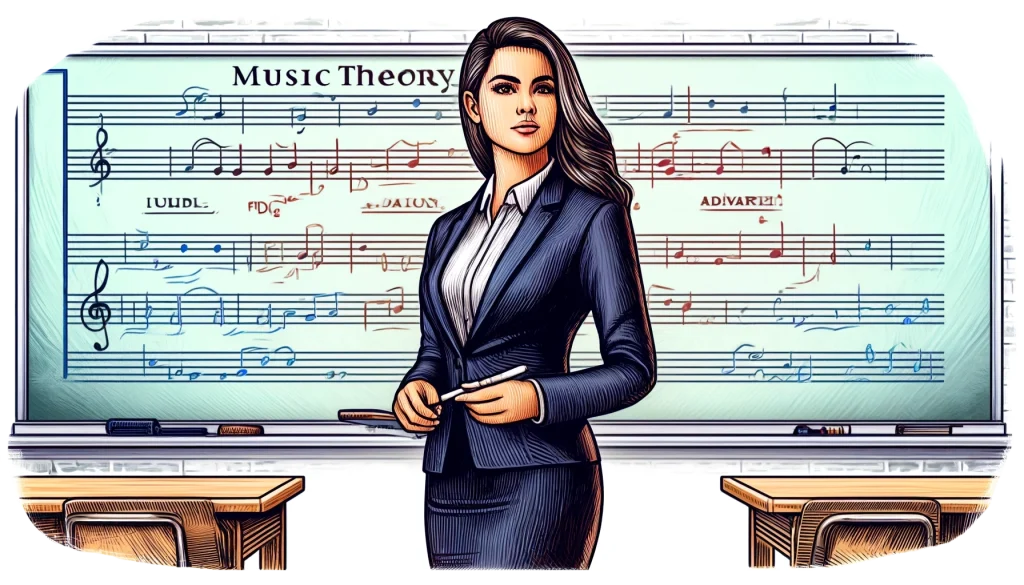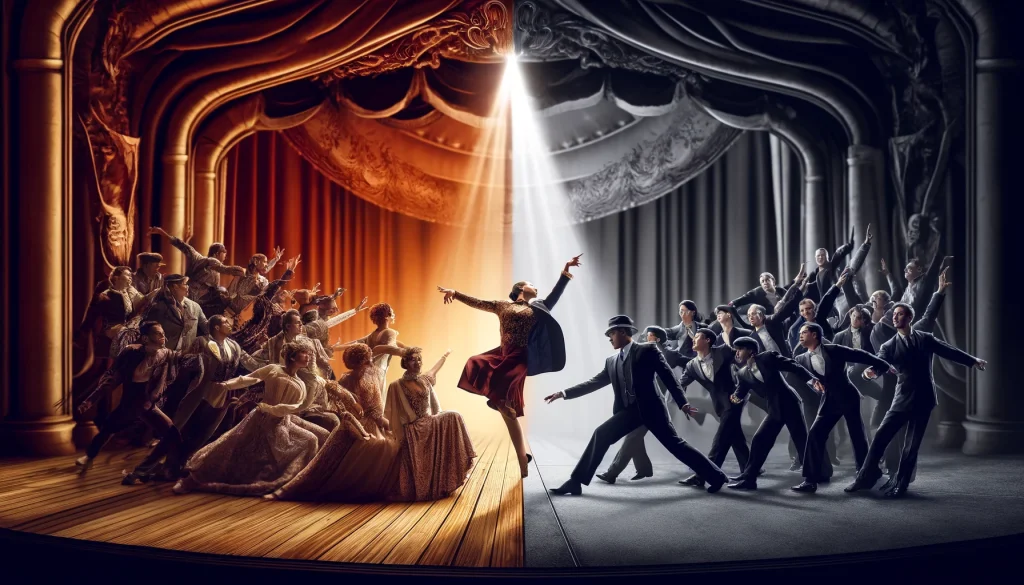It’s important for emerging musicians in all fields to immerse themselves in those fields. To help, I’ll be releasing a series of basic guides that offer starting places for learning about your field. It’s critical to note that these guides are very incomplete and meant as entry points for people who have inadequate exposure to their fields. This first guide is on musical theatre.
Eras/Subgenres | People Involved | People You Should Know | Recommended Listening/Watching | Terminology | Further Resources
Eras/Subgenres
For simplicity, I’ll classify these eras based on the type of musical that was being written. Notice that all three of these continue to the present.
- ca. 1920-Present: Musical Revue: Musical revue places the songs at the center of the work. Writers tend to focus on writing songs and then creating a loose plot to string them together. Some musical revues essentially have no through-line (connecting plot) and are more like Saturday Night Live where the sketches are musical numbers. Recent shows that take pre-existing popular songs and weave a story around them are called Jukebox Musicals.
- 1943-Present: Book Musicals: The book musical places the book (script) at the center of work. The story is primary and the musical numbers emerge organically from the story. Most musicals you know are probably book musicals. The earliest is probably Show Boat in 1927, but the genre didn’t really take hold as the standard convention until Oklahoma in 1943.
- 1970-Present: Concept Musicals: A concept musical places a concept at the center of the work and the plot (however much there is one) and the musical numbers are at the service of that concept. The earliest concept musical is probably Allegro (1947), but the genre really took hold with Company (1970). There’s a lot of disagreement in the field about what should be classified as a true concept musical.
People Involved
Creative
I am using “creative” to mean those who write the work before it’s mounted (produced), though almost all people involved do creative work.
- Composer: Writes melody and chord changes
- Lyricist: Writes words to the song
- Book Writer (AKA- Librettist): Writes the book (script) to the show. This is sometimes called the “libretto” (the word used for the text in an opera)
- Orchestrator (AKA- Arranger): Arranges the music the composer wrote for all of the different instruments in the pit orchestra (they may change some chords too)
Production Crew (partial list)
- Director
- Producer
- Musical Director (often also the conductor/first keyboardist)
- Stage Manager
- Assistant Director (AD)
- Assistant Stage Manager (ASM)
- Lighting Designer
- Set Designer
- Sound Designer
- Costumer
- Choreographer
- Dialect Coach
- Crew/Stagehands
Performers (partial list)
- Actors
- Singers
- Dancers
- Instrumentalists
- Understudies
- Swings
- Dance Captains
People You Should Know
This is a partial list, meant to give you a solid starting place. There are many superb and important people omitted.
Composers
See Composer-Lyricists Listed Below
- Leonard Bernstein
- Stephen Flaherty
- George Gershwin
- Jerome Kern
- Tom Kitt
- Frederick Loewe
- Richard Rodgers
- Jule Styne
- Andrew Lloyd Webber
- Frank Wildhorn
Lyricists
See Composer-Lyricists Listed Below
- Lynn Ahrens
- Fred Ebb
- Ira Gershwin
- Oscar Hammerstein II
- Yip Harburg
- Lorenz Hart
- Alan Jay Lerner
- Brian Yorkey
Composer-Lyricists
- Jason Robert Brown
- William Finn
- Jerry Herman
- Elton John
- Jonathan Larson
- Robert Lopez
- Lin-Manuel Miranda
- Benj Pasek and Justin Paul
- Cole Porter
- Stephen Schwartz
- Stephen Sondheim
Others
Many people in the field have limited knowledge of book writers, orchestrators, directors, choreographers, and producers, let alone the host of other creative people involved in making musicals come to life. They are incredibly important parts of the field, without which musicals simply wouldn’t exist. I am omitting them here, because this is an introductory guide and, in the professional world, performers are somewhat less expected to know who they are. As you progress further in the field, I recommend you invest in learning more about them, especially as many of them have truly defined the field, such as producer Cameron Mackintosh, producer/director Harold “Hal” Prince, and choreographers Jerome Robbins and Bob Fosse.
Performers
While I’m tempted to include this list, I think one of the best ways to learn about the important performers in musical theatre history (and at present) is by exposing yourself to the recommended musicals listed below.
Recommended Listening & Watching
This list includes shows I don’t like and omits shows I love, but it’s a solid starting list of important and well-known musicals. When you buy recordings, it’s often best to start with the Original Broadway Cast recordings (or, in shows that launched in the UK, you could also try the original London Cast recordings). Sometimes, later recordings are stronger, but these original cast recordings are a good starting place.
- Show Boat (1927)
- Anything Goes (1934)
- Porgy and Bess (1935)
- Oklahoma (1943)
- Carousel (1945)
- Annie Get Your Gun (1946)
- Brigadoon (1947)
- South Pacific (1950)
- West Side Story (1957)
- My Fair Lady (1957)
- The Music Man (1957)
- Gypsy (1959)
- The Fantasticks (1960)
- Camelot (1960)
- Hello, Dolly (1964)
- Cabaret (1966)
- Mame (1966)
- Hair (1968)
- 1776 (1969)
- Company (1970)
- Jesus Christ Superstar (1970)
- Godspell (1970)
- Pippin (1972)
- A Little Night Music (1973)
- A Chorus Line (1975)
- Chicago (1975)
- Sweeney Todd (1979)
- La Cage Aux Folles (1983)
- Cats (1983)
- The Phantom of the Opera (Webber, 1986)
- Little Shop of Horrors (1986)
- Les Misérables (1987)
- Assassins (1990)
- Jekyll & Hyde (1990)
- The Secret Garden (1991)
- Falsettos (1992)
- Beauty and the Beast (1994)
- Rent (1996)
- Ragtime (1996)
- The Lion King (1998)
- Thoroughly Modern Millie (2002)
- Hairspray (2002)
- The Last Five Years (2002)
- Wicked (2003)
- The Light in the Piazza (2003)
- Avenue Q (2004)
- The 25th Annual Putnam County Spelling Bee (2005)
- Spring Awakening (2006)
- Grey Gardens (2006)
- In the Heights (2008)
- Next to Normal (2009)
- The Book of Mormon (2011)
- Fun Home (2015)
- Hamilton (2016)
- Dear Evan Hansen (2017)
Terminology
Here are some good musical theatre terms to know, as a start. Research these to learn more. See the further resources section for glossaries and dictionaries to help you find the definitions you don’t know.
- 11 O’clock Number
- 32-Bar Song
- Apron
- Ballad
- Baritenor
- Belt/Belter
- Blocking
- Book/Libretto
- Concert Version
- Cue
- Curtain
- Curtain Call
- Dramaturg
- Legit
- Overture
- Patter Song
- Piano-Vocal Score
- Pit
- Pit Orchestra
- Proscenium Stage
- Reading/Staged Reading
- Role
- Score
- Scrim
- Sitzprobe
- Theatre in the Round
- Thrust
- Triple Threat
- Upstage (as a verb)
- Up-tempo
- Vocal Score
- Vocal Selections
- Wandelprobe
- Wings
You should also know the parts of the stage (image source):

Further Resources
There are myriad books, articles, documentaries, websites, etc. on musical theatre. Here are a few good ones with which to start:
- Documentary: Broadway, the American Musical (PBS) – buy on amazon (highly recommended!)
- Chris Caggiano’s List of the 100 Best Musicals of All Time (check out the rest of his site too)
- 23 Must-Know Musical Theater Audition Terms by Andrew Byrne at Backstage
- 60+ Theatre Terms Every Actor Should Know by JV Mercanti at Backstage
- Short Glossary of Theatre Terms from California State University
- TDF Theatre Dictionary (also includes some videos)
- Wikipedia List of Tony and Olivier Award Winning Musicals
- How to Become a Musical Theater Actor by Casey Mink at Backstage
- 5 Types of Songs You Should Have in Your Audition Book by Andrew Byrne at Backstage
Comments
Please share your comments on additional terms, musicals, people, etc. you think should be included above. I may periodically update this guide based on your suggestions!
©2017 Aaron Alon. All Rights Reserved.











0 Comments